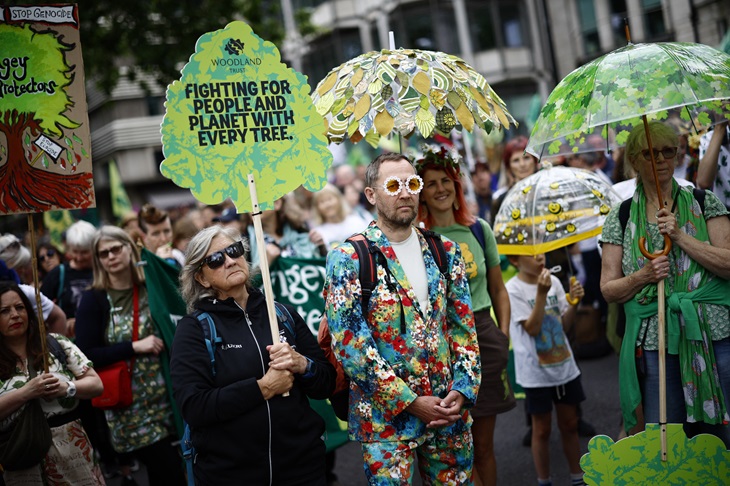
Demonstrators with nature-themed outfits and umbrellas take part in the "Restore Nature Now" protest supported by Extinction Rebellion (XR), National Trust and WWF in London on June 22, 2024. (Photo by BENJAMIN CREMEL / AFP) (Photo by BENJAMIN CREMEL/AFP via Getty Images)
URGENT UPDATE: A growing debate over the intersection of wealth and climate activism has erupted in Australia, as political candidates challenge the priorities of affluent voters. In a recent discussion, Daniel Lewkovitz slammed the “eco-chic” mentality among the wealthy, accusing them of creating a harmful disconnect with the realities faced by the working class.
Speaking against the backdrop of an upcoming election, Lewkovitz highlighted that many affluent Australians are more focused on virtue signaling than addressing pressing issues like housing, food security, and education for lower-income citizens. “These are people who are fabulously wealthy… they feel terrible about it,” Lewkovitz stated on September 26, 2025, during a campaign event in the Wentworth constituency.
The remarks come as rich Australians increasingly support policies they believe will combat climate change, such as the controversial Net Zero initiative. However, Lewkovitz argues that these policies often come at the expense of those struggling to make ends meet. He pointedly remarked, “They’re going to see everything they pay in life go up so that someone who’s fabulously wealthy can drive their kid to a private school in an electric car, and that’s not right!”
The urgency of this issue is underscored by recent shifts in public sentiment. As wealth disparity widens, it becomes crucial for political leaders to address the disconnect between elite priorities and the needs of average citizens. The Islamic State’s rise and subsequent fears have also contributed to a cultural shift, causing many wealthy Australians to retreat from direct humanitarian efforts abroad.
As the election approaches, candidates are grappling with how to engage elite voters who desire climate action but may lack awareness of the tangible impacts of their choices. Lewkovitz criticized the notion that affluent individuals can absolve their guilt through environmentally friendly purchases or policies, stating, “A wind turbine is never going to love you back, and a solar panel won’t absolve your sins.”
This situation raises critical questions about who bears the responsibility for addressing societal inequities. Lewkovitz’s call for a more practical and grounded approach to politics is resonating with voters who are concerned about the broader implications of wealth-driven policies.
Authorities and political analysts are now watching closely to see how this debate unfolds in the lead-up to the election. With only weeks until voters head to the polls, the stakes couldn’t be higher for both candidates and the communities they aim to serve.
As the conversation around climate activism and wealth continues, it is essential for voters to consider the real-world implications of their choices. The next steps in this ongoing dialogue could shape Australia’s political landscape in profound ways.
Stay tuned for more updates as this story develops, and engage in the conversation about how wealth, activism, and policy intersect in today’s society.






